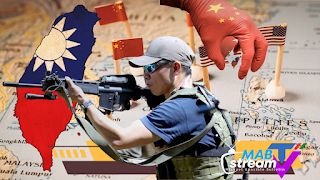How Taiwanese preparing for China's invasion | Things we need to know China Taiwan's Conflict
Let's have a discussion about the current situation in Taiwan and the Taiwan Strait, as these waters have experienced increased tensions in recent years. Chinese fighter jets have been crossing the median line off the Taiwan Strait, causing concern for Taiwan and raising questions about the potential outcomes of this ongoing power struggle between the US and China. Many are apprehensive about the future implications of these developments. It's a complex and pressing issue that has everyone wondering about the eventual resolution.
Taiwan is a contentious issue between China and the US due to its unique political status as a self-governing democratic territory. China claims Taiwan as its own, but many Taiwanese dispute this claim. The US has also become involved, further complicating the situation. To understand the current tensions, it's important to know the historical background. Taiwan was ruled by Imperial China for 200 years, then by Japan for 50 years after winning a war against China. After World War II, Taiwan was returned to China, but the nationalist forces of Chiang Kai-shek fled to Taiwan after losing the Chinese Civil War to the Communist forces. This complex history has led to Taiwan becoming a focal point for competing interests.
In 1949, China split into two rival governments, one in Taiwan and one in Beijing. The government in Taiwan was called the Republic of China (ROC), and the one in Beijing was known as the People's Republic of China (PRC). The United States supported the ROC due to its opposition to communism, and it held a seat at the UN. However, in the 1970s, the UN passed a resolution recognizing the PRC as the only lawful representatives of China, leading to the ROC losing its seat.
What does this all mean for Taiwan's political status today? Well, it leaves Taiwan in a state of limbo, with Beijing's perspective being that Taiwan is part of China and will eventually be reunited with the mainland. Taiwan's stance on its own status varies depending on the political party in power, with some leaning more towards China and others leaning more towards independence. However, most parties have been cautious about explicitly pushing for full sovereignty, instead opting to navigate a middle ground that seems to align with the preferences of the Taiwanese people.
When considering the political spectrum in Taiwan, it becomes clear that the majority of voters prefer the status quo. This means they do not want immediate unification with China or immediate independence as the Republic of Taiwan. Despite not loving this gray area, Taiwanese voters understand that any radical change could lead to war, which they want to avoid.
The United States' position on Taiwan is somewhat ambiguous, often referred to as strategic ambiguity. While they acknowledge that Taiwan is part of China and do not have an official embassy in Taipei, they also support Taiwan's defense by selling them weapons and providing military aid. This approach is meant to deter China from taking aggressive actions towards Taiwan.
The United States opposes any unilateral changes to the current situation by either side. This means that if Taiwan were to declare independence unilaterally, the US would be less likely to support Taiwan if China were to attack. However, if China were to attack Taiwan without provocation, the US would be very likely to defend Taiwan because that would be China unilaterally changing the status quo.
During Donald Trump's presidency, he developed closer ties with Taiwan than his predecessors, and some argue that President Biden has continued to strengthen these ties even further at times. President Biden has been clear in his support for Taiwan.
China publicly criticized the comment, prompting Biden to clarify that it did not indicate a shift in US policy. Tensions heightened once more when US House Speaker Nancy Pelosi visited Taiwan, marking the highest-ranking US official to do so in 25 years. This visit was seen as provocative by China, which responded by conducting new live fire military exercises and encircling Taiwan in the narrow Taiwan Strait.
The nature of PRC threats towards Taiwan has changed significantly. Following Nancy Pelosi's visit, there has been a drastic increase in the quantity of fighter jets entering Taiwan's Air defense identification zone. Furthermore, these jets are now crossing the median line between Taiwan and the PRC, and they are using more advanced and potentially damaging fighter jets.
In summary, if tensions escalate, there is a possibility of a conflict between the US and China. This emphasizes the significance of developments in Taiwan, particularly the upcoming presidential election this 2024. However, some argue that the US presidential election in November will ultimately shape the direction of US-China relations.
We should wait until after the November election in the United States to fully grasp the implications for Taiwan's next President. The future of Taiwan's relationship with the United States could potentially change significantly depending on who will be the next US President elected, making it crucial to wait for the election results before predicting the impact on Taiwan.




Comments
Post a Comment